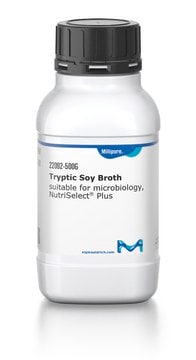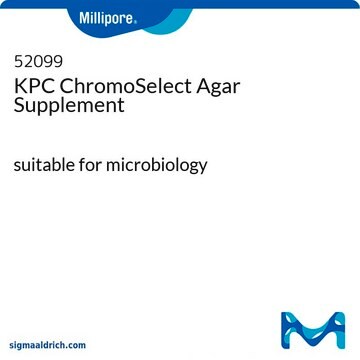90922
Mueller Hinton Broth 2
NutriSelect® Plus, suitable for microbiology, Cation-adjusted
Synonym(s):
M-H 2 Broth, M-H 2 Broth, Mueller Hinton II Broth, Mueller Hinton II Broth
About This Item
Recommended Products
Quality Level
sterility
non-sterile
form
powder
shelf life
limited shelf life, expiry date on the label
composition
acid hydrolysate of casein, 17.5 g/L
beef extract, 3 g/L
starch, 1.5 g/L
packaging
bottle of 500 g
manufacturer/tradename
NutriSelect® Plus
technique(s)
microbe id | susceptibility testing: suitable
microbiological culture: suitable
color
light yellow
final pH
7.3±0.2 (25 °C)
application(s)
clinical testing
food and beverages
microbiology
suitability
nonselective for Enterococcus spp.
nonselective for Escherichia coli
nonselective for Neisseria spp.
nonselective for Pseudomonas spp.
nonselective for Staphylococcus spp.
nonselective for bacteria (General Media)
nonselective for coliforms
Related Categories
General description
Application
Features and Benefits
- Quality control with growth promotion test according to industry standards
- Quality assurance acc. to ISO 9001
- Cost-efficient powdered media
Preparation Note
Note: This medium is supplemented with appropriate salts to provide 20-25 mg/l of calcium and 10-12.5 mg/l of magnesium and as additionally required to suit performance parameters.
Footnote
The designations basic, plus, or prime are added to indicate the quality control level, from basic quality control to standard QC plus to prime for full regulatory compliance.
Legal Information
Storage Class
11 - Combustible Solids
wgk_germany
WGK 3
flash_point_f
Not applicable
flash_point_c
Not applicable
ppe
Eyeshields, Gloves, type N95 (US)
Choose from one of the most recent versions:
Already Own This Product?
Find documentation for the products that you have recently purchased in the Document Library.
Customers Also Viewed
Our team of scientists has experience in all areas of research including Life Science, Material Science, Chemical Synthesis, Chromatography, Analytical and many others.
Contact Technical Service











